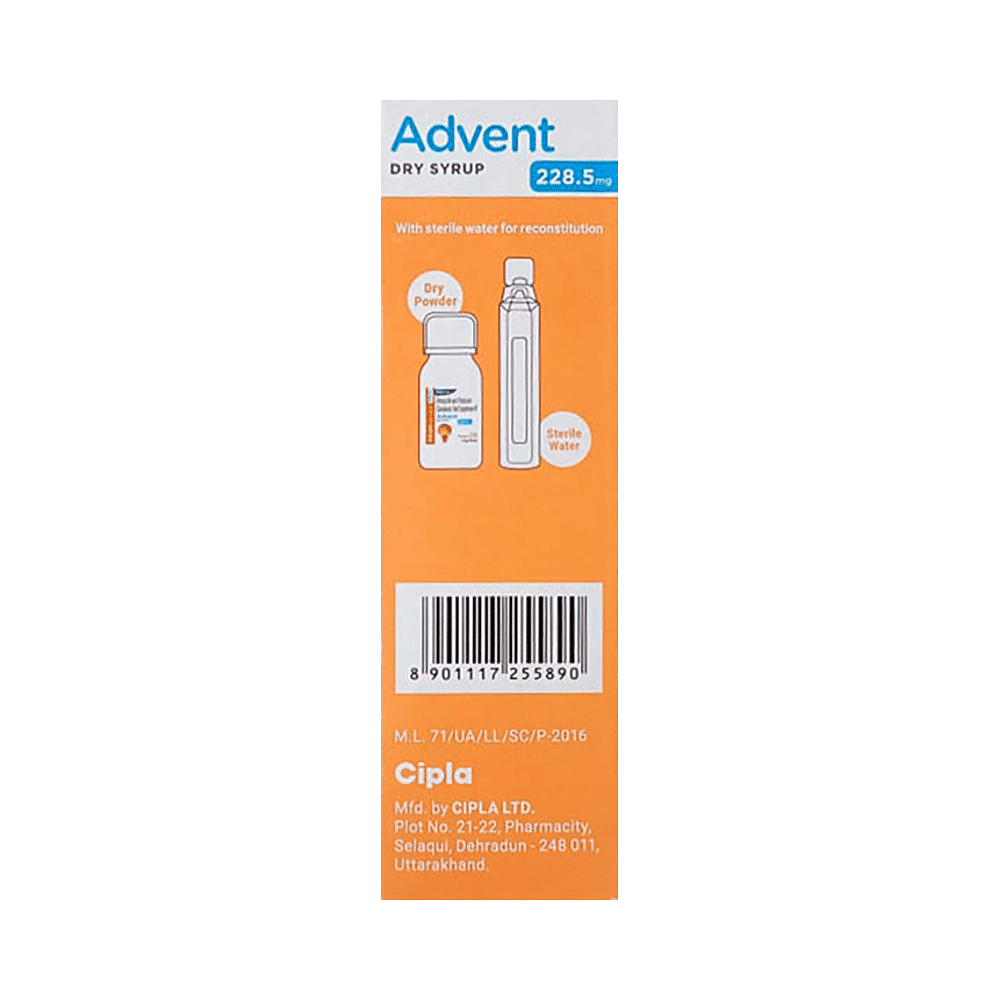
Moxigap CV Dry Syrup
Manufacturer
Everwell Pharma Pvt Ltd
Salt Composition
Amoxycillin (200mg/5ml) + Clavulanic Acid (28.5mg/5ml)
Key Information
Short Description
Moxigap CV Dry Syrup is an antibiotic medicine that helps treat bacterial infections of the ear, nose, throat, chest, lungs, teeth, skin, and urinary tract.
Dosage Form
Dry Syrup
Introduction
Moxigap CV Dry Syrup is an antibiotic medicine that helps treat bacterial infections of the ear, nose, throat, chest, lungs, teeth, skin, and urinary tract. It is capable of killing bacteria that have become resistant to other therapies and thus also helps treat tuberculosis that is resistant to other treatments.
Directions for Use
Your child must complete the entire course of antibiotics. Stopping too soon may cause the bacteria to multiply again or cause another infection.
How it works
Moxigap CV Dry Syrup is an antibiotic. It has two active agents amoxycillin and clavulanic acid. Amoxycillin works by preventing the formation of the bacterial protective covering (cell wall) essential for the survival of the bacteria. Whereas clavulanic acid serves a special purpose of inhibiting an enzyme (beta-lactamase) that is produced by resistant bacteria. This makes the combination of amoxycillin and clavulanic acid an effective line of treatment for many types of infections.
Quick Tips
Your child must complete the entire course of antibiotics. Stopping too soon may cause the bacteria to multiply again or cause another infection. Your child may have a bitter taste in the mouth after the intake of Moxigap CV Dry Syrup. Eating citrus fruit or sipping plenty of water or fruit juice may help. Encourage your child to drink plenty of water in case diarrhea develops as a side effect. Never give Moxigap CV Dry Syrup until and unless prescribed by the doctor. Do not give Moxigap CV Dry Syrup to treat common cold and flu-like symptoms caused by viruses. Never save medicine for future illnesses. Check ‘expiry’ before giving Moxigap CV Dry Syrup to your child. Immediately discard all the expired medicines. Stop Moxigap CV Dry Syrup immediately if your child develops an itchy rash, facial swelling, or breathing difficulty. Report to the doctor without any delay.
Related Medicines

Advent 228.5mg Dry Syrup Tangy Orange

Clav First Dry Syrup

Avunox CV Dry Syrup

Sunclav Dry Syrup

Claver Dry Syrup

Dolclav DS Dry Syrup

Cobex CL Dry Syrup

Moxidel CV Dry Syrup

Augliff Dry Syrup

Hexmox CV Dry Syrup
Frequently asked questions
Can other medicines be given at the same time as Moxigap CV Dry Syrup?
Moxigap CV Dry Syrup may interact with other medications or substances. It's important to tell your child's doctor about all medications they are taking before starting Moxigap CV Dry Syrup. You should also consult with your child's doctor before giving any medicine to your child.
Can I get my child vaccinated while on treatment with Moxigap CV Dry Syrup?
Antibiotics usually do not interfere with the ingredients in vaccines or cause a negative reaction in a child who has just been vaccinated. However, children taking antibiotics should avoid getting vaccinated until they recover from the illness. Once your child feels better, the vaccine can be administered.
Which lab tests may my child undergo while taking Moxigap CV Dry Syrup on a long-term basis?
Periodically, if this treatment is used long term, a doctor may monitor kidney and liver function tests to ensure the child's condition remains stable.
Can I give a higher than the recommended dose of Moxigap CV Dry Syrup to my child?
Giving a higher dose than the recommended amount may increase the risk of side effects. If your child experiences more severe symptoms, consult their doctor for re-evaluation.
Can I stop giving Moxigap CV Dry Syrup to my child when the symptoms are relieved?
Do not discontinue this medication until the full course is completed, even if you feel better. Symptoms may improve before the infection is fully cured. Continue treatment as directed by your child's doctor.
Can the use of Moxigap CV Dry Syrup cause diarrhea?
Yes, Moxigap CV Dry Syrup can cause diarrhea. It is an antibiotic that kills harmful bacteria. Additionally, it may affect the beneficial bacteria in your child's stomach and lead to diarrhea. Encourage your child to drink plenty of water or other fluids if they experience diarrhea. If diarrhea persists, seek medical advice. Do not give any other medication without consulting a doctor.
Do all viral common colds result in secondary bacterial infection?
Most viral common colds do not lead to secondary bacterial infections. Giving antibiotics in viral infections can increase the risk of side effects, so consult with your child's doctor about appropriate treatment.
The mucus coming out of my child’s nose is yellow-green. Is it a sign of a bacterial infection?
Yellow or green mucus in the nose does not always indicate that antibiotics are needed. In common colds, the mucus tends to thicken and change color from clear to yellow or green. Symptoms usually last for 7-10 days.
Is there any sign which shows that my child needs immediate medical attention?
Call your child's doctor immediately if they experience severe allergic reactions (breathing problems, skin rashes), gastrointestinal infections (diarrhea), or liver damage (weakness, paleness, vomiting). Although rare, these serious side effects require medical care.


